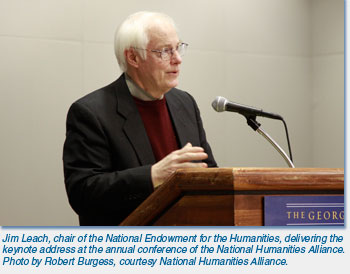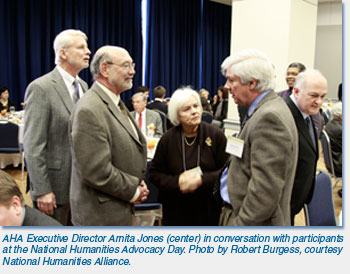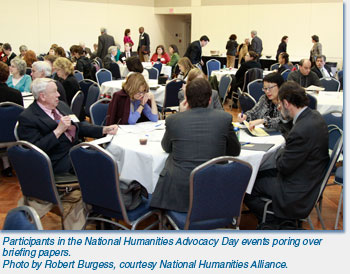News
Humanities Advocacy Day 2010
 On March 8 and 9, 2010, more than 200 college and university teachers, museum professionals, librarians, archivists, and independent scholars, gathered in Washington, D.C., for the 2010 national conference of the National Humanities Alliance (NHA), of which the AHA is a member. The conference was combined with Humanities Advocacy Day, when 98 participants fanned out across Capitol Hill to visit 127 House and Senate offices to urge support for federal agencies that sustain research, education, public programs, and preservation in history and other fields.
On March 8 and 9, 2010, more than 200 college and university teachers, museum professionals, librarians, archivists, and independent scholars, gathered in Washington, D.C., for the 2010 national conference of the National Humanities Alliance (NHA), of which the AHA is a member. The conference was combined with Humanities Advocacy Day, when 98 participants fanned out across Capitol Hill to visit 127 House and Senate offices to urge support for federal agencies that sustain research, education, public programs, and preservation in history and other fields.
On Monday, participants gathered at George Washington University to discuss the state of the humanities and the role of the humanities in public policy.
A keynote address by Jim Leach, chair of the National Endowment for the Humanities, was a highlight of the program. Speaking about the endowment’s new thematic emphasis, “Bridging Cultures,” Leach argued that the humanities matter most in trying times. Referring to the wars in Afghanistan and Iraq, he asked, “Wouldn’t it be wiser to have a cultural component of understanding prior to entering a conflict rather than after?” Observing that we are in a polarized political climate in which partisans bandy about “truly history-blind conceptualizations,” he suggested the necessity of studying the history of American debates about how we can “come together as a society and respect each others’ views and yet stay together as a people.” The American people are socially divided and don’t understand what is happening in the world and in the country, he argued, and in this situation, “not to advance the humanities would be an inhuman judgment.”
A series of policy briefings highlighted the NHA’s legislative priorities. A modest increase in funding for the National Endowment for the Humanities (NEH) is a primary goal. The endowment can currently fund only 17 percent of the grant proposals it receives, indicating a tremendous unmet need; in contrast, the National Science Foundation funds 32 percent of proposals. The alliance is also urging that the NEH should receive funding for grants to graduate students, as it is one of few federal grant making agencies that do not directly support student research. Starting in 2010, students will be able to attend NEH summer seminars and institutes, a response to suggestions from the humanities community.
 Speakers noted the current uncertainty about the fate of the Teaching American History grant program. The president’s budget proposal consolidated the grants with other education programs in the arts, foreign languages, and civics into a new authority called “Effective Teaching and Learning for a Well-Rounded Education.” Participants were urged to advocate for preserving the largest single source of federal funding for history education, either separately or as part of the new authority, and for maintaining current funding levels.
Speakers noted the current uncertainty about the fate of the Teaching American History grant program. The president’s budget proposal consolidated the grants with other education programs in the arts, foreign languages, and civics into a new authority called “Effective Teaching and Learning for a Well-Rounded Education.” Participants were urged to advocate for preserving the largest single source of federal funding for history education, either separately or as part of the new authority, and for maintaining current funding levels.
The alliance is also requesting a modest budget increase and reauthorization for the National Historical Publications and Records Commission, a small and relatively inexpensive but vital program that has faced elimination in the past.
NHA is partnering with the American Association of Museums to urge reauthorization and a modest increase to the agency’s 2011 budget. Participants in the upcoming Museums Advocacy Day will in turn argue for increased NEH funding.
Other priorities include the Jacob K. Javits Fellowship Program, which provides four years of support for students pursuing doctoral degrees in the arts, humanities, and social sciences. It is the only federal fellowship for graduate students in the humanities. The NHA is also supporting small funding increases for the Fulbright Hays International Education Programs and the Foreign Language Assistance Program.
 A common theme at the meeting was the urgent need for calling attention to the need for humanities funding in a difficult economic and political year. Legislators are concerned about the deficit, but also hesitate to cut popular programs. Although most agree on the importance of education funding, there is a temptation to focus more on vocational and scientific fields. Martha Kanter, under secretary of the U.S. Department of Education, suggested that advocates remind legislators that the humanities “teach people to think critically and in context” and are essential for a well-rounded education, an informed citizenry, and for training the kind of flexible workforce necessary in a changing economy.
A common theme at the meeting was the urgent need for calling attention to the need for humanities funding in a difficult economic and political year. Legislators are concerned about the deficit, but also hesitate to cut popular programs. Although most agree on the importance of education funding, there is a temptation to focus more on vocational and scientific fields. Martha Kanter, under secretary of the U.S. Department of Education, suggested that advocates remind legislators that the humanities “teach people to think critically and in context” and are essential for a well-rounded education, an informed citizenry, and for training the kind of flexible workforce necessary in a changing economy.
At an evening reception at the Rayburn House Office Building’s Gold Room sponsored by History, the Humanities Alliance’s immediate past president, John Churchill, received an award for his outstanding contributions to the humanities community.
The full tables at the conference demonstrated that the humanities community understands the need to communicate the importance of scholarship and public programs in the humanities to Congress. For more information about the National Humanities Alliance and the policy issues discussed at the conference, see www.nhalliance.org.
Debbie Ann Doyle, the AHA’s administrative manager, also serves as the Association’s public history coordinator.
Tags:
Comment
Please read our commenting and letters policy before submitting.






